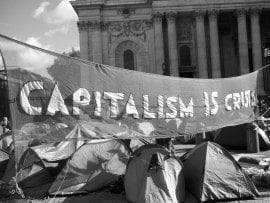On Wednesday 2nd April 2014, roughly 450 people filled the LSE’s Old Theatre to hear a lecture on ‘The Seventeen Contradictions of Capitalism’, given by the prominent Marxist academic, Professor David Harvey, who was launching his new book on the Marxist theory of capitalist crisis. Josh Holroyd reviews Harvey’s analysis of the crisis of capitalism.
On Wednesday 2nd April 2014, roughly 450 people filled the LSE’s Old Theatre to hear a lecture on ‘The Seventeen Contradictions of Capitalism’, given by the prominent Marxist academic, Professor David Harvey.
The event was arranged as part of the launch of Harvey’s new book, ‘Seventeen Contradictions and the End of Capitalism’, and so was largely a summary and explanation of some of the main issues covered therein. These included the housing crisis, the role of money under capitalism, the relationship between private property and the state, the causes of capitalist crisis, and the need for capitalism to constantly seek out new forms of consumption.
Running through all of Harvey’s analysis was the central idea that crisis is an inherent and unavoidable feature of capitalism and that, rather than solving its contradictions, the capitalist system simply moves them around until they eventually become “contagious and explosive”.
Harvey also eloquently exposed the one-sided nature of both Keynesian and neo-liberal economy theory, explaining that the former concentrates solely on the realisation of surplus-value (i.e. the ability to sell commodities) by attempting to shore up demand, while the latter concentrates on the production of surplus-value by “disciplining the working class”, driving down wages etc.
Interestingly, Harvey concluded that there was no way out of the current crisis on a capitalist basis as all attempts to extract more profit from the working class are cutting the market; but equally, governments are unable to intervene with Keynesian measures (with the current exception of China, which is accumulating its own contradictions on the basis of its Keynesian policies) due to the mountain of debt that has piled up over decades. Such an analysis echoes that made by the Marxists in Socialist Appeal and the International Marxist Tendency.
However, Harvey was not quite so clear on the question of how to break with the crisis-ridden capitalist system and replace it with the rationally planned, use-value focused economy which he mooted as an alternative. Harvey limited himself to calling for people to “get active” and (somewhat surprisingly) raised the possibility of convincing members of the ruling class to effectively expropriate themselves – a mistake specifically dealt with by Marx and Engels after the experience of the Paris Commune.
Such a tepid programme for change stood in sharp contrast to Harvey’s superb analysis of the capitalist economy, but this is perhaps a reflection of his desire to analyse the problems in our society, not to provide a solution for them.
Sadly, the “End of Capitalism” tantalisingly referred to in the title of Harvey’s book remained relatively unexplored save for the warning that capitalism can overcome its own contradictions, but only at a massive human and environmental cost. Hopefully the book itself will shed more light on this point – review to follow!
The full video and audio of Harvey’s talk can be viewed at the LSE website.
See our education section on Marxist economics for a number of articles about the Marxist theory of capitalist crisis.






